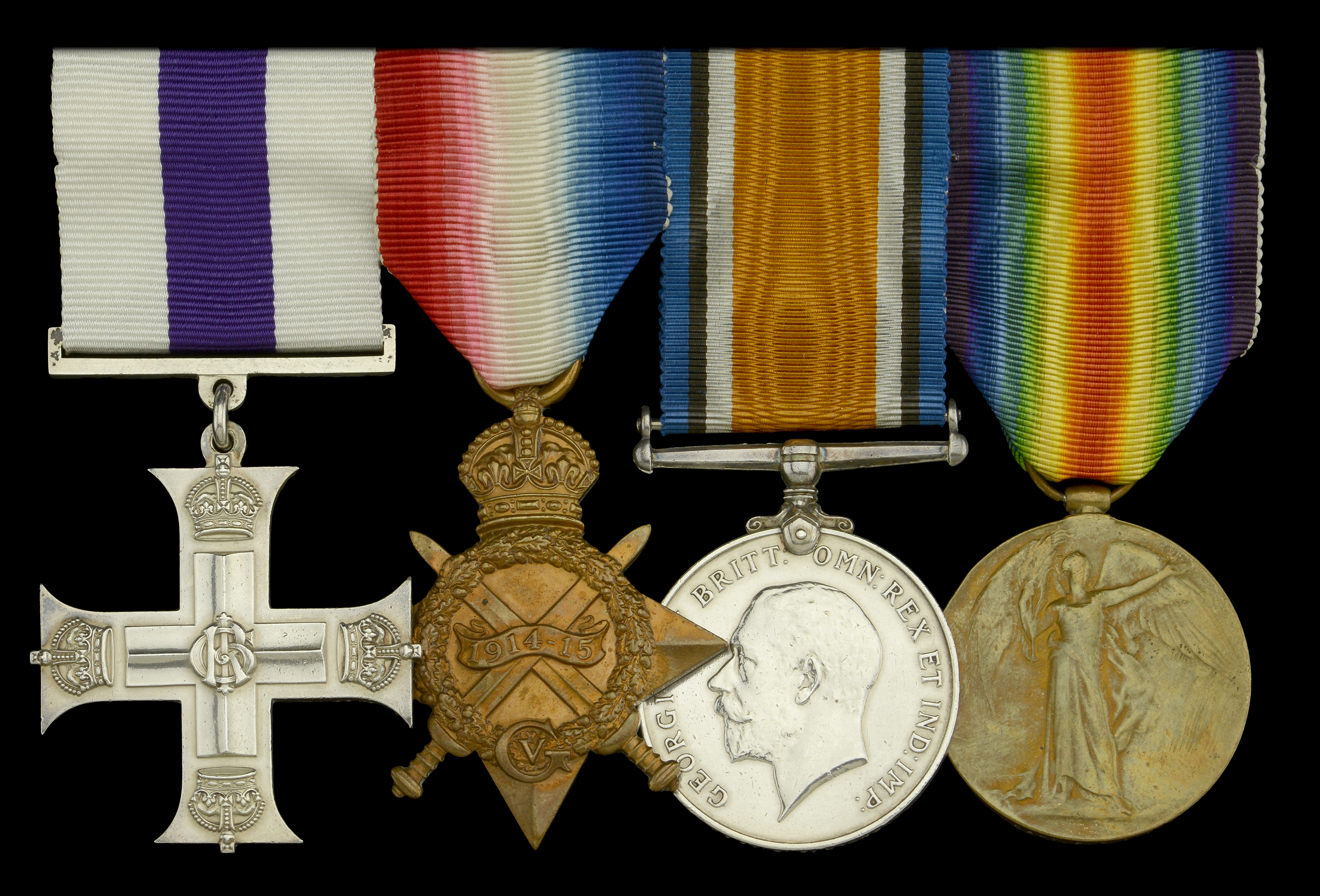A Great War ‘Salonica’ M.C. group of four awarded to Major E. F. Lyons, 10th Battalion, Devonshire Regiment, who was wounded at Petit Couronné on 24 April 1917 Military Cross, G.V.R., the reverse contemporarily engraved ‘Maj. E. F. Lyons, Devonshire Regt.’; 1914-15 Star (Lieut. E. F. Lyons. Devon. R.); British War and Victory Medals (Capt. E. F. Lyons.) mounted for wear, light contact marks, very fine (4) £600-£800 --- Provenance: Dix Noonan Webb, June 1999 M.C. London Gazette 1 January 1919 No citation - Award most likely made in recognition of action 5 September 1918 when he led a raid with 60 men from B Company on the Bulgarian trenches at Nose, Salonica. Ernest Frederick Lyons was born in India in 1890. A Bank Clerk by occupation employed by Baring Brothers, London, he attested for the 28th Battalion County of London (Artists Rifles) on 9 July 1909 and as a Private he attended each of the pre-Great War annual camps. Embodied at the outbreak of the Great War he was discharged on appointment to a commission as Second Lieutenant in the 10th (Service) Battalion, Devonshire Regiment, on 17 September 1914; this newly formed battalion completed training on Salisbury Plain and embarked for France on 22 September 1915. Entraining for Marseilles in November prior to posting to Salonica, they disembarked on 21 November 1915 and were employed in the Lines of Communication. Moving to the Lake Doiran area opposite Petit Couronné, Lyons was appointed Temporary Captain and Acting Adjutant of the 10th Battalion on 20 December 1916. Taking part in the two raids on Petit Couronné he received gunshot wounds to his head and hand on 24 April 1917. On recovery he led a patrol on Bergerie Woods on 26 November 1917. Assuming command of ‘B’ Company he led a raid by 60 men on the Bulgarian trenches at Nose on 5 September 1918. Following the end of hostilities the 10th Battalion represented the British Army during the entry of the King and Queen of Roumania into Bucharest on 1 December 1918. For his services during the Great War Lyons was awarded the Military Cross on 1 January 1919 - this most likely would have taken into consideration his leadership during the raid the previous September. Appointed Acting Major on 9 February 1919 he assumed command of the 10th Battalion in April 1919. Embarking at Varna the battalion crossed the Black Sea and disembarked at Batoum and were employed in policing Armenia. During this time the Turkish Lieutenant General Nuri Pasha was put under charge of the 10th Battalion who were seriously reduced in numbers due to the demobilisation of men at the end of the War. A party of Turkish supporters organised a successful raid to rescue Nuri Pasha on 8 August 1919 killing both the escorts from the battalion. Following this escape Major Lyons was placed under open arrest on 14 August 1919 pending court martial for neglect. Martial Law was declared in Batoum on 4 September 1919 and Major Lyons’s court martial hearing commenced 13 September 1919. The proceedings lasted three days and the defence made much play of the seriously depleted ranks, many of whom being new recruits, available to carry out the demanding duties required. The battalion War Diary for 15 September 1919 is annotated ‘found NOT GUILTY’ reflecting the amount of feeling in support for their acting commanding officer by the officers and men. Relinquishing the acting rank of Major he embarked at Batoum for home arriving 24 October 1919 and was demobilised 16 December 1919. Found fit for appointment to a Regular Commission, Lyons was appointed Lieutenant in the Middlesex Regiment on 8 June 1921 with seniority from 4 November 1916. Promoted to Captain in 1922, he served with the Middlesex Regiment variously at home, in Egypt, in Palestine, and with the Shanghai Defence Force between 1921 and 1935. Retiring with the rank of Major on 12 February 1935 he was recalled and mobilised for the Second World War on 16 September 1939. Found fit for home service only he was posted to the Machine Gun Training Centre and then the Small Arms School at Hythe. Unfortunately his health failed and he was retired 28 December 1940. Whilst in Cornwall he fell while walking at Land’s End and died from his injuries on 23 September 1941, aged 51, leading to an open verdict by the Coroner. Sold with copied service record and other research.
Auctioneer's Buyers Premium: 24% (+VAT)
There is an additional charge of 4.95% (+VAT/sales tax)
See Full Terms And Conditions





